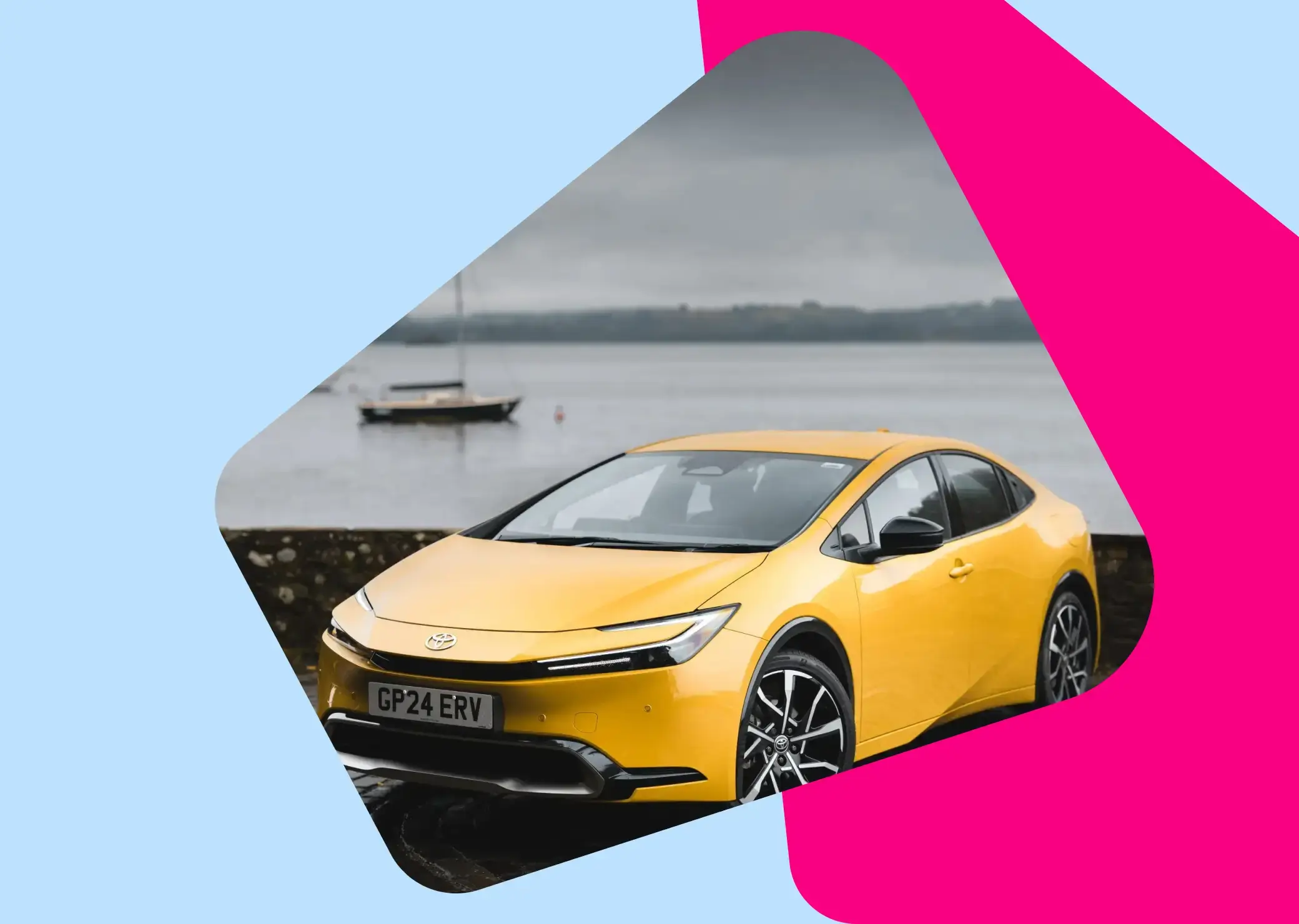- Carmoola
- Blog
- Cars and Gadgets
- What is a hybrid car and how do they work?
- 🗞 Cars and Gadgets
- Last updated: Jan 8, 2025
- 8 Min Read
What is a hybrid car and how do they work?
Written by

Verified by


See how much you can borrow in 60 seconds
| Representative Example | |
|---|---|
| Loan amount | £10,000 |
| Interest rate | 13.9% APR |
| 54 payments of | £246 |
| Total cost of credit | £3,284 |
| Option to purchase fee | £1 |
| Total payable | £13,285 |
Been shopping for a new hybrid car and found your head aching afterwards? We don’t blame you: all manner of terminology and technology tends to get thrown around when it comes to hybrids and, if you’ve not encountered them before, it can all be a bit baffling.
Don’t worry, though. Hybrid cars and their technologies are not as complicated as they seem and, with a bit of advice from your old pals at Carmoola, you'll quickly find out how they work and narrow down which might be best for you.
Hybrids have lots going for them, after all, including improved efficiency compared to regular petrol or diesel cars. And, importantly, they go about their business without pure electric pitfalls such as charging- and range-related issues.
What is a hybrid car?
A hybrid might sound like something from a science-fiction film, and appear complicated, but the reality is pretty straightforward.
Effectively, a hybrid car is one that blends a conventional petrol or diesel engine with some kind of electric assistance or drive, as well as other efficiency-boosting technologies. This allows them to deliver reduced emissions and improved economy, potentially shrinking your fuel bills significantly.
Some hybrid cars can also offer improved performance thanks to their use of electric power, or the capability to travel on electric power alone for substantial distances, making them more appealing.
Many buyers like hybrids because they serve as a stepping stone between traditional cars with internal combustion engines and pure electric vehicles. If an electric car doesn’t suit you, but you want to transition towards greener motoring, a hybrid could subsequently be a smart choice.

How do hybrid cars work?
A hybrid car will feature an internal combustion engine, either a petrol or a diesel one, that is assisted by an electric motor. These power sources will work together to drive the car down the road, with the car using one or the other, or combining both, to maximise efficiency at that moment.
There’s a bit more to it than that, though. In many conventional cars, when you brake or lift off the accelerator, energy is wasted. When braking, for example, a lot of potentially useful energy is just converted into heat.
In a hybrid, that wasted energy is instead captured through a process called regenerative braking, where the electric motor is used as a generator. The power captured is stored in a battery and can then be used to assist the engine or drive the car on electric power, reducing the need to burn fuel.
More complicated and powerful hybrid systems can propel the car on electric power alone, thanks to their bigger batteries and motors, and some can be topped up from a plug to provide more all-electric motoring.
Hybrid technology also provides other interesting opportunities. Some hybrids may feature additional motors to increase their performance or grant all-wheel drive, which you’ll often encounter in the best hybrid SUVs. You’ll also find that technologies such as stop-start systems, which further cut noise, emissions, and fuel use, are common in hybrid cars.
Types of hybrid cars
There are three distinct types of hybrid cars:
Mild hybrid
These are the basic type of hybrid and use a petrol or diesel engine that benefits from some light electrical assistance. Usually, it’ll be what’s called an integrated starter-generator (ISG) that can also be used to capture waste energy when the car slows down. This helps improve efficiency, which is useful, but mild hybrids can’t drive around on electric power alone.
Full hybrid
You’ll sometimes hear these referred to as strong or self-charging hybrids, because they generally feature a bigger battery and more substantial electric motor. This allows them to travel for some distance on electric power alone, which makes them more effective and further cuts their running costs. Toyota’s Prius is a classic example of a full hybrid.
Plug-in hybrid
These take the concept of a full hybrid but add a higher-capacity battery and a charging system. The bigger battery allows a plug-in hybrid car to travel longer distances on electric power alone, while the plug-in charging system allows the battery to be topped up. This allows owners to use the car like an electric vehicle, if their journeys are short enough, meaning the engine is only needed when travelling further afield. This type of hybrid car can also be referred to as a plug-in hybrid electric vehicle (PHEV).

Pros and cons of hybrid cars
A hybrid can make for a superb new car purchase, but you need to be aware of these pros and cons before you take the plunge.
Pros
- Hybrids are usually efficient and reliable
- They can be smooth and relaxing to drive
- You don’t need to worry about charging
- A hybrid could save you money in the long run
Cons
- They cost more than normal petrol or diesel cars
- Some hybrids have very little or no all-electric range
- Plug-in hybrids can be ineffective if you don’t charge them
- Some are slower and heavier, and less fun, than normal cars

Is a hybrid car right for you?
There are lots of reasons you might want to consider a hybrid. There are the obvious positives, such as their eco-friendlier nature and lower running costs, but you might also find the technology and how they drive interesting, or you might have discovered a great hybrid car finance deal.
A hybrid car can also be a good halfway house between a normal petrol or diesel and a pure electric car. This means you can introduce some greener motoring into your lifestyle without having to tackle issues such as range and charging.
However, whether a hybrid car will be advantageous really depends on the type of driving you do, and how you use and drive the car. For example, if you’re doing lots of stop ‘n’ start driving, and slower-speed routes, a hybrid can work well and deliver benefits for both you and those around you.
If your regular routes are all motorways or freer-flowing roads, the hybrid battery will often deplete quickly, or the system might not be able to help much, leaving you driving a heavier car that can use more fuel than a standard petrol or diesel car.
Plug-in hybrids, similarly, require careful consideration. They can offer decent all-electric range, and big fuel savings, but they’ll deliver neither if you don’t charge them regularly. And, given their expensive nature, the savings might never make a difference. As always, do the sums, including depreciation, and work out what your overall costs might be.
FAQs about hybrid cars
What’s the difference between a hybrid and an electric car?
What’s the difference between a hybrid and an electric car?
A hybrid car blends traditional internal combustion, be it a petrol or diesel engine, with some degree of electric assistance. An electric car, on the other hand, has just its battery and electric motor, or motors, to get it down the road.
Do hybrid cars need charging?
Do hybrid cars need charging?
The only type of hybrid that you’ll need to worry about plugging in is, as you may have already guessed, a plug-in hybrid. This type of hybrid has a larger battery, allowing it to travel for further distances on electric power alone. If you want to make the most of its capabilities and keep your fuel bills down, you’ll ideally need to keep it regularly charged.
Are hybrid cars cheaper to run than petrol cars?
Are hybrid cars cheaper to run than petrol cars?
A hybrid car can deliver lower running costs than a conventional car, especially if it’s a strong or plug-in hybrid. However, it will depend on what it is, how you drive it, and where you drive it. If you do lots of motorway miles, for example, a strong or plug-in hybrid might not offer you any benefits.
Hybrids also typically cost more than normal petrol or diesel cars. It might subsequently take a long time for you to recoup that price difference and make actual savings. As is the case with any new car purchase, you need to do your sums before jumping in with both feet.
What’s the lifespan of a hybrid car battery?
What’s the lifespan of a hybrid car battery?
There are a lot of factors that affect how long a hybrid car battery will last, including the type of battery and hybrid system. However, the length of a manufacturer’s hybrid battery warranty should give you an idea as to the minimum lifespan.
Take Toyota, for example. Its cars have up to ten years or 100,000 miles of warranty cover, which includes the battery. If you opt for annual hybrid health checks, the battery warranty can be extended up to 15 years. In any case, remember to check the figures in the warranty, just to avoid any surprises later.
See how much you can borrow in 60 seconds
| Representative Example | |
|---|---|
| Loan amount | £10,000 |
| Interest rate | 13.9% APR |
| 54 payments of | £246 |
| Total cost of credit | £3,284 |
| Option to purchase fee | £1 |
| Total payable | £13,285 |
Related articles
Can you drive in the UK on a foreign licence?
If you’re new to the UK, you might be keen to get behind the wheel to explore on the open road. You can usually drive in the UK...
What happens if my car is written off and it’s still on finance?
Accidents happen. When split-second decisions and challenging conditions make driving difficult at the best of times, even the...
Which credit reference agencies do lenders use?
When applying for car finance, your credit score can make a significant difference to the APR you’re offered, your repayment...

.webp?width=832&height=592&name=customer-support%20(1).webp)










.webp?width=400&height=285&name=online-shoppers-with-dog%20(1).webp)


.jpg?width=500&height=356&name=Vintage%20car%20going%20to%20an%20old%20town-1%20(1).jpg)





